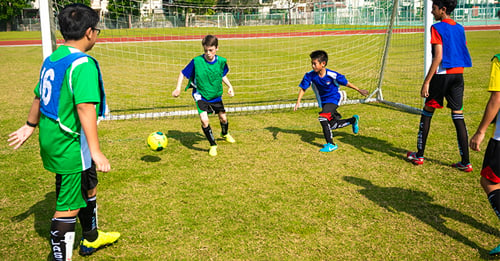“It is impossible to live without failing at something, unless you live so cautiously that you might as well not have lived at all, in which case you have failed by default.”
Competition is prevalent in a child’s life from a young age. From playing games with their friends to competing on a sports team to writing a test in school, the notion of winning or losing is something children are well versed in.
But what children might not understand as thoroughly are the benefits that come with learning losing is okay, that winning is not the only option.
As parents and educators, it is our responsibility to reinforce this lesson. But why? What are the benefits your children receive when they lose in a competition or one of their ideas fails?
Failure Can Put Your Children on a Path to Success
“Failure comes part and parcel with invention. It’s not optional. We understand that and believe in failing early and iterating until we get it right,” said Jeff Bezos, the CEO of Amazon, in an article by Business Insider.
Bezos believes failed experiments and thinking are the “necessary evil” to creating those inventions that succeed.
In an interview at the World Economic Forum, Jack Ma, Founder and Executive Chairman of Alibaba Group, outlined how failure prepared him to be a CEO. He was the only one out of 24 people to not get hired by KFC, and he was rejected from Harvard after applying 10 times.
These two examples illustrate the importance of teaching our children to not fear failure, but rather embrace and become tolerant of it. If we teach our children - and even ourselves - to see failure as an opportunity, we can unlock potential we didn’t even know we had. This potential can be for growth, for invention, for innovative thinking, for service, really for anything we set our minds to.
Failure Teaches Your Children Valuable Lessons
Empathy, collaboration, a sense of camaraderie, perseverance, these are just some of the fundamental skills children acquire through losing.
According to Melody Brook, a family therapist, losing helps your children learn the importance of showing empathy towards others. Because they understand what it feels like to be in another individual’s shoes, they learn how to relate with them and lend a helping hand when necessary.
When your children lose, they learn the value each member brings to the team. They start to learn strategy, noting what works and what does not and use that knowledge to better themselves and their teammates.
When your children lose, they also learn the work ethic needed to succeed.
Failure is an Opportunity to Grow
As a parent, it’s typical to want your children to succeed and “win” in everything they do. But when this instinct goes unchecked, it leads you to “protecting” your children from loss, failure or disappointment.
When children are protected from failure, “You are not equipping them with the ways to solve their problems on their own. If you shelter them from negative outcomes when they’re young, they are not equipped to handle negative outcomes when they’re older,” said Sam Weinman, author of “Win at Losing: How Our Biggest Setbacks Can Lead to Our Greatest Gains” in an interview with The Washington Post.
Though failure is never a fun experience, it’s something that your children can learn from. After failing, they need to sit back and examine what they can do differently next time.
According to Weinman, if you teach your children the value of failure, they are more likely to go into situations with a mindset of, “I may lose, but I can use that to learn and get better. Even if I lose, I’m still going to have fun.”
This growth mindset is something we use at our British international school, which may be surprising given how people traditionally picture a British classroom.
“In British classrooms ‘mistakes’ were ‘embarrassing’ and teachers strove to minimise public ‘mistakes’ to avoid the child ‘losing face,'" wrote John Hattie in his book, Visible Learning: A Synthesis of Over 800 Meta-Analyses Relating to Achievement.
We approach teaching and learning in a new, innovative way. We focus on developing the necessary elements for students to become successful, social, intellectual adults. It’s a curriculum that empowers our students with a growth mindset and teaches them to embrace failure.
Through this type of learning environment, students attain the knowledge provided through a British international school, while also developing all other aspects of their being.
How to Teach Children Losing is Okay
Learning that it’s okay to lose is a lesson taught both at home and in school.
As a parent, you can:
- Redefine what winning looks like
- Praise what is going well using the sandwich technique. Start with a compliment, then tell them the area they need to improve and end with another compliment.
- Set a good example
- Practice
- Keep an open line of communication and acknowledge your children’s feelings when it comes to failure
As outlined above, there’s an innovative approach to the British international school curriculum that helps foster character, emotional intelligence and grit in your children.
We invite you to download a free white paper on an, "Innovative Approach to the British Curriculum."



